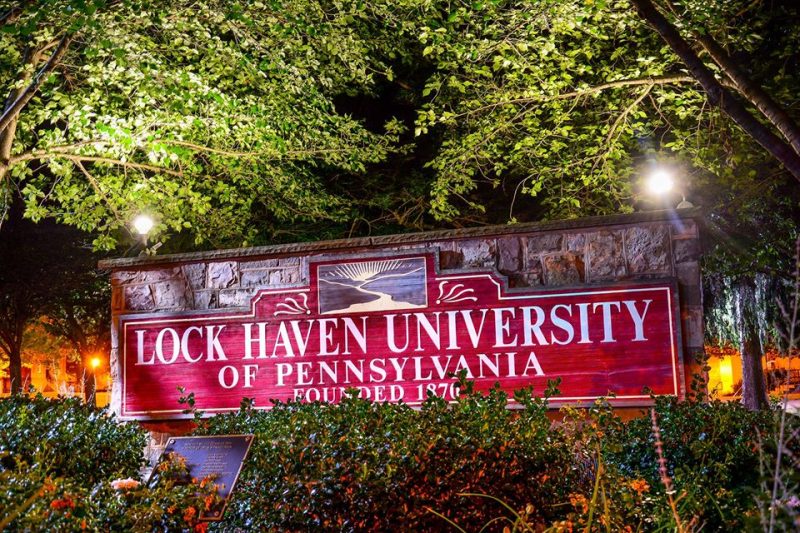LOCK HAVEN, Pa. — Lock Haven University has announced today the decision to move to a mostly remote learning environment for the fall 2020 semester with limited exceptions and limited on-campus residency. This is a revision of earlier announced plans, which relied more on face-to-face instruction and a semi-traditional on campus experience.
Looking at the recent rapid rise in COVID-19 infections across the country, Dr. Robert Pignatello, LHU president, said LHU has reached the consensus that bringing the entire campus community back – approximately 3,500 students, faculty and staff is, “too risky to undertake.”
“We are not winning the battle against COVID-19,” Pignatello argued. “Our students come from all parts of Pennsylvania, many from areas where the virus is now surging; they also come from 11 states and seven countries. This reality is of great concern and requires major changes to our operational plan.” “We can do a lot to mitigate the risk, and our original plan did so, but we have concluded that with the entire campus back, we cannot do enough to reduce the risk to our students, faculty and staff and their families, making these revisions necessary.”
While the majority of LHU’s courses will transition to remote delivery, some hands-on and experience-based courses will include face-to-face instruction. Studio art, labs, clinicals and some first-year-experience courses are among those that will be taught face-to-face with a limited number of students enrolled in these courses. International students, students experiencing hardship and students enrolled in face-to-face courses will be able to apply for on-campus residence by completing a housing exemption form. “We expect up to 85% of classes now to be remote and on campus residency to be two-thirds below the typical level,” Pignatello said. Any face-to-face activities and instruction will still end before Thanksgiving on Nov. 20 as previously planned.
Following the move to remote instruction in the spring, LHU remains confident in their ability to provide a more robust experience through remote learning to its students this fall. “Students will still receive the same high-quality education that The Haven is known for,” Pignatello said. “We have learned a lot about providing a more vigorous experience through remote learning. Our faculty are dedicated to student success and are committed to walking alongside our students as mentors and advisors, as will coaches and other staff members.”
Pignatello urged students to continue their studies despite the shift in modalities. The university is taking multiple measures to ensure a successful semester for students and to keep them connected and engaged. Students will receive assistance with access to technology, with any related hardships, increased mentorship and advisement and a reduction in the cost of attendance.
LHU students who will be transitioning to a fully on-line course delivery this fall will receive an approximate reduction in fees of $300 depending on course modality and campus location. “Starting, continuing and completing your degree is more important than ever, and we intend to help our students do that,” Pignatello stressed.
LHU also has examined many other challenges to holding the fall semester in person. The issues are complicated and present numerous obstacles to providing a safe and rewarding teaching and learning environment and campus experience at this time, according to Pignatello.
Factors which have informed the decision for LHU include the overall risk of contributing to the spread of the disease among students, their families, faculty and staff and the greater community. Other factors include inadequate testing and contact tracing including test result delays of up to two weeks, the challenge of adequate spacing for face-to-face instruction given existing classroom configurations, the high risk of an in-term outbreak and greater related disruption, the risk involved with high levels of congregate housing, the impact of unmonitored off campus activity and the increased risk to faculty and staff who have either personal or family vulnerabilities.
“Right now we feel that COVID-19 can spread far too easily in the everyday collegiate environment,” Pignatello said. “Having significantly fewer people on campus is an imperative to avoid this. Until the virus is under better control and we can return to safer and more normal operations, it is up to us as a family to look out for one another, to care for one another and to make hard decisions that are in our collective best interest to protect one another. There is hope late this year for vaccines, treatments and better testing. But that time is not now. This is a once in a century event in our history that requires short-term adjustments until it is safe to return to greater normalcy.”
More information will be provided to students through their LHU email. A hotline has been established for questions at 570-484-3700 and will be available from 8am-6pm beginning July 28. The university’s COVID-19 Frequently Asked Questions (FAQs) have been updated and can be viewed at www.lockhaven.edu/virusinfo/virusfaq.html. Questions also may be sent to update@lockhaven.edu.
For more information on Lock Haven University, visit www.lockhaven.edu, email admissions@lockhaven.edu, or call 570-484-2011.
Lock Haven University (LHU) is a small, public university located on the West Branch of the Susquehanna River in the scenic mountains of Pennsylvania. LHU’s experience-based approach to learning prepares students for a lifetime of success. The university features outstanding academic programs taught by experienced faculty. Since 1870, The Haven has provided an unbeatable combination of quality, affordability and value to the region, the Commonwealth and beyond.
LHU is a member of Pennsylvania’s State System, the largest provider of higher education in the Commonwealth.
